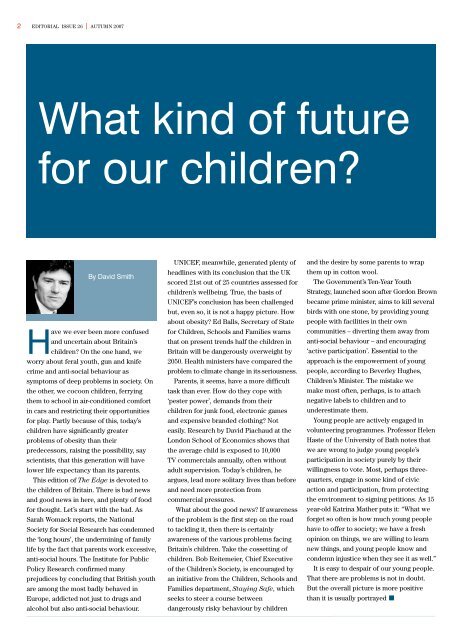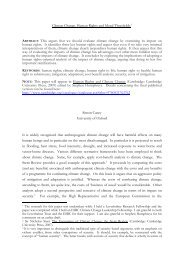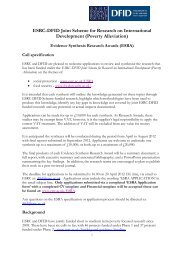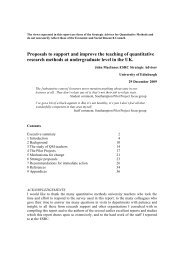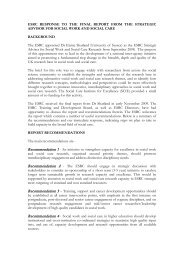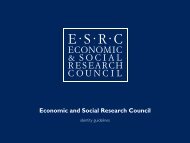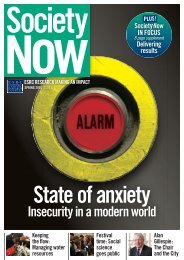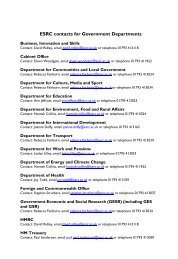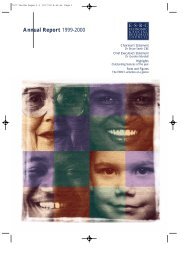Issue 26 - November 2007 (PDF, 1.69Mb) - ESRC
Issue 26 - November 2007 (PDF, 1.69Mb) - ESRC
Issue 26 - November 2007 (PDF, 1.69Mb) - ESRC
Create successful ePaper yourself
Turn your PDF publications into a flip-book with our unique Google optimized e-Paper software.
2 EDITORIAL ISSUE <strong>26</strong> |<br />
AUTUMN <strong>2007</strong><br />
What kind of future<br />
for our children?<br />
By David Smith<br />
Have we ever been more confused<br />
and uncertain about Britain’s<br />
children? On the one hand, we<br />
worry about feral youth, gun and knife<br />
crime and anti-social behaviour as<br />
symptoms of deep problems in society. On<br />
the other, we cocoon children, ferrying<br />
them to school in air-conditioned comfort<br />
in cars and restricting their opportunities<br />
for play. Partly because of this, today’s<br />
children have significantly greater<br />
problems of obesity than their<br />
predecessors, raising the possibility, say<br />
scientists, that this generation will have<br />
lower life expectancy than its parents.<br />
This edition of The Edge is devoted to<br />
the children of Britain. There is bad news<br />
and good news in here, and plenty of food<br />
for thought. Let’s start with the bad. As<br />
Sarah Womack reports, the National<br />
Society for Social Research has condemned<br />
the ‘long hours’, the undermining of family<br />
life by the fact that parents work excessive,<br />
anti-social hours. The Institute for Public<br />
Policy Research confirmed many<br />
prejudices by concluding that British youth<br />
are among the most badly behaved in<br />
Europe, addicted not just to drugs and<br />
alcohol but also anti-social behaviour.<br />
UNICEF, meanwhile, generated plenty of<br />
headlines with its conclusion that the UK<br />
scored 21st out of 25 countries assessed for<br />
children’s wellbeing. True, the basis of<br />
UNICEF’s conclusion has been challenged<br />
but, even so, it is not a happy picture. How<br />
about obesity? Ed Balls, Secretary of State<br />
for Children, Schools and Families warns<br />
that on present trends half the children in<br />
Britain will be dangerously overweight by<br />
2050. Health ministers have compared the<br />
problem to climate change in its seriousness.<br />
Parents, it seems, have a more difficult<br />
task than ever. How do they cope with<br />
‘pester power’, demands from their<br />
children for junk food, electronic games<br />
and expensive branded clothing? Not<br />
easily. Research by David Piachaud at the<br />
London School of Economics shows that<br />
the average child is exposed to 10,000<br />
TV commercials annually, often without<br />
adult supervision. Today’s children, he<br />
argues, lead more solitary lives than before<br />
and need more protection from<br />
commercial pressures.<br />
What about the good news? If awareness<br />
of the problem is the first step on the road<br />
to tackling it, then there is certainly<br />
awareness of the various problems facing<br />
Britain’s children. Take the cossetting of<br />
children. Bob Reitemeier, Chief Executive<br />
of the Children’s Society, is encouraged by<br />
an initiative from the Children, Schools and<br />
Families department, Staying Safe, which<br />
seeks to steer a course between<br />
dangerously risky behaviour by children<br />
and the desire by some parents to wrap<br />
them up in cotton wool.<br />
The Government’s Te n - Year Yo u t h<br />
S t r a t e g y, launched soon after Gordon Brown<br />
b e c a m e prime minister, aims to kill several<br />
birds with one stone, by providing young<br />
people with facilities in their own<br />
communities – diverting them away from<br />
anti-social behaviour – and encouraging<br />
‘active participation’. Essential to the<br />
approach is the empowerment of young<br />
people, according to Beverley Hughes,<br />
Children’s Minister. The mistake we<br />
make most often, perhaps, is to attach<br />
negative labels to children and to<br />
underestimate them.<br />
Young people are actively engaged in<br />
volunteering programmes. Professor Helen<br />
Haste of the University of Bath notes that<br />
we are wrong to judge young people’s<br />
participation in society purely by their<br />
willingness to vote. Most, perhaps three-<br />
quarters, engage in some kind of civic<br />
action and participation, from protecting<br />
the environment to signing petitions. As 15<br />
year-old Katrina Mather puts it: “What we<br />
forget so often is how much young people<br />
have to offer to society; we have a fresh<br />
opinion on things, we are willing to learn<br />
new things, and young people know and<br />
condemn injustice when they see it as well.”<br />
It is easy to despair of our young people.<br />
That there are problems is not in doubt.<br />
But the overall picture is more positive<br />
than it is usually portrayed


